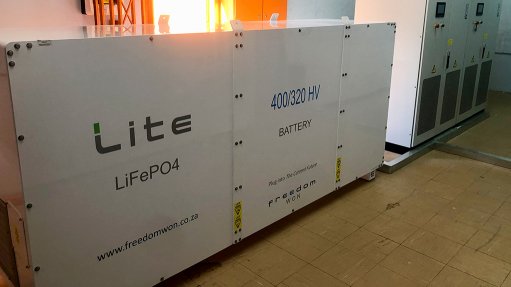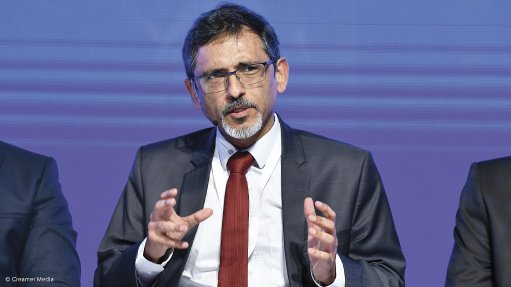Spectrum key to driving digital and economic transformation
As the long-awaited spectrum is released, the improved access to spectrum for smaller players will increase competition in the market and ultimately benefit the consumer.
In March, the Independent Communications Authority of South Africa (Icasa) completed a nearly week-long auction process that netted the national fiscus over R14.4-billion.
This was the first significant release of spectrum for mobile broadband services in South Africa in over a decade.
The limited spectrum available prior to this had impacted the industry and citizens in measurable ways and constrained growth within the telecommunications market and reduced broadband penetration throughout the country, said IDC sub-Saharan Africa senior research and consulting manager and telco and Internet of Things (IoT) lead Keoikantse Marungwana.
Spectrum is a relatively rare resource that requires careful allocation to ensure that it ignites the Fourth Industrial Revolution and drives innovation and economic development.
“Over the years, the release of spectrum has been delayed by numerous legal challenges brought by market players who felt disadvantaged for various reasons, arguing issues related to the procedures, fairness, legality, competition issues and more,” he explained, adding that access to high demand spectrum was heavily contested owing to the economic opportunities it provided.
“Now many of the challenges that caused delays in spectrum release are resolved through policy certainty, regulatory interventions, court judgments and consultations between the regulator and market players.”
He pointed out that Icasa used an innovative auction process that provided equitable access to spectrum for both smaller and larger network operators.
“This has then allowed for more players to gain access to high demand spectrum across the low- and mid-bands and to accelerate their plans for rural broadband coverage using fourth-generation and fifth-generation (5G) technologies.”
Six qualified bidders – Cell C, Liquid Intelligent Technologies, MTN, Rain, Telkom and Vodacom – participated in Icasa’s two-phased auction process from March 8 to 17, in an effort to secure a spectrum allocation.
During the opt-in bidding phase on March 8, Rain secured two 10 MHz in the 700 MHz band and 10 MHz in the 2 600 MHz band for R1.15-billion. Rain’s participation in the main auction from March 10 resulted in the addition of another 10 MHz in the 2 600 MHz band, spending a total of R1.43-billion by the end of the auction.
Telkom was awarded two 10 MHz in the 800 MHz band at a cost of R1.5-billion in the opt-in phase and, on the main stage, it bought 22 MHz in the 3 500 MHz band, bringing its total spend to R2.11-billion.
Liquid Telecom secured 4 MHz in the 3 500 MHz band for R111-million, while Cell C bought 10 MHz in the same band for R288.2-million.
MTN, for R5.15-billion, landed 20 MHz in the 800 band, 40 MHz in the 2 600 band and 40 MHz in the 3 500 band, while Vodacom secured 20 MHz, 80 MHz and 10 MHz in the 700, 2 600 and 3 500 bands respectively for a pricetag of R5.38-billion.
“A good example of spectrum allocation in action is Rain. The company has increased its portion in the 2 600 MHz band, which will enable them to improve their offering of high-speed fixed-wireless broadband and to launch new services for enhanced mobile broadband services.”
The company has also used the spectrum auction as an opportunity to move into the low-band below 1 GHz with a 20 MHz purchase in the 700 MHz band which enables them to launch wider coverage of high-speed 5G mobile broadband and IoT services.
“All operators now have additional spectrum resources to grow their network coverage and to deliver improved broadband speeds. This will also give them the impetus and scale they need to launch new and innovative services that use emergent technologies such as 5G, IoT and edge computing. There is also now spectrum certainty as all legal hurdles have been ironed out,” said Marungwana
To ensure that this allocation of spectrum has a long-term positive impact on the sector and country, he explained that operators would now need to accelerate their capital expenditure outlay for network expansion and upgrading as this would ensure a measurable return on investment.
While operators will still put national mobile broadband as the primary goal for expansion and growth, there remains demand for advanced use cases beyond Internet access – from both consumers and enterprise customers – and service providers will need to invest in these advanced use cases to extract maximum value from the spectrum.
“Enterprise customers want private 5G/long-term evolution networks for mining and campus environments and 5G networks with service level guarantees for their mission-critical applications. Consumers, on the other hand, want advanced viewing and gaming experiences that include 4K streaming and artificial/virtual reality applications.”
However, there remains an uncertainty.
The regulatory obligations and restrictions on the licensees will need to provide operators with the flexibility they need to fully exploit their spectrum holdings through many different commercial models and not restrict them to only using the spectrum for themselves.
Further, there is the yet to be determined impact of the government’s revision of the Wireless Open Access Network (Woan) policy.
“There is a total lack of policy certainty. The Woan policy mandate was clear in mandating the closure of the digital divide, particularly in rural areas, and to increase competition and transformation among players in the telecommunications industry.
“Yet the reason given for the revision of this policy is that the spectrum Icasa has set aside is insufficient. But this can be solved by prescribing the correct amount of spectrum instead of cancelling it altogether,” explained Marungwana.
“The Woan revision and policy objectives have now been shifted to a new policy called ‘Next Generation Radio Frequency Spectrum Policy’ that is still under development, and operators are still finding their feet in the new allocation and market. This keeps the sector on an uncertain footing, but at least it is one step further than before.”
Comments
Press Office
Announcements
What's On
Subscribe to improve your user experience...
Option 1 (equivalent of R125 a month):
Receive a weekly copy of Creamer Media's Engineering News & Mining Weekly magazine
(print copy for those in South Africa and e-magazine for those outside of South Africa)
Receive daily email newsletters
Access to full search results
Access archive of magazine back copies
Access to Projects in Progress
Access to ONE Research Report of your choice in PDF format
Option 2 (equivalent of R375 a month):
All benefits from Option 1
PLUS
Access to Creamer Media's Research Channel Africa for ALL Research Reports, in PDF format, on various industrial and mining sectors
including Electricity; Water; Energy Transition; Hydrogen; Roads, Rail and Ports; Coal; Gold; Platinum; Battery Metals; etc.
Already a subscriber?
Forgotten your password?
Receive weekly copy of Creamer Media's Engineering News & Mining Weekly magazine (print copy for those in South Africa and e-magazine for those outside of South Africa)
➕
Recieve daily email newsletters
➕
Access to full search results
➕
Access archive of magazine back copies
➕
Access to Projects in Progress
➕
Access to ONE Research Report of your choice in PDF format
RESEARCH CHANNEL AFRICA
R4500 (equivalent of R375 a month)
SUBSCRIBEAll benefits from Option 1
➕
Access to Creamer Media's Research Channel Africa for ALL Research Reports on various industrial and mining sectors, in PDF format, including on:
Electricity
➕
Water
➕
Energy Transition
➕
Hydrogen
➕
Roads, Rail and Ports
➕
Coal
➕
Gold
➕
Platinum
➕
Battery Metals
➕
etc.
Receive all benefits from Option 1 or Option 2 delivered to numerous people at your company
➕
Multiple User names and Passwords for simultaneous log-ins
➕
Intranet integration access to all in your organisation


















